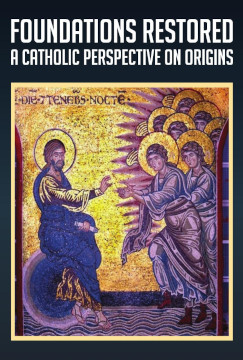- Welcome to St. Isidore forum.
Recent posts
#21
Catholic Resources / Re: Additional Catholic eBook ...
Last post by Geremia - July 30, 2025, 04:37:34 PMQuote from: indexcatholicus on July 29, 2025, 05:08:29 AMDoes anyone have a link to the Ite ad Thomam's Out of Print Library (ITOPL) files? The previous link is broken.Try these:
Quote from: Strider3000 on July 30, 2025, 05:20:05 AMHere is the original:
https://files.colin.coffee/share.cgi?ssid=cca8575426f2480d9a8aac2e16c41aa7
Here is with the OCR layer:
https://files.colin.coffee/share.cgi?ssid=4423236f470145bc99fbdaaaf30fdd80
#22
Forum-Related / Re: Suggestions & Problems
Last post by Geremia - July 29, 2025, 12:26:37 PM@justjeff There's also calibre_annas_archive, which is a store for Anna's Archive (shadow library). Most of the St. Isidore e-book library is on there, and I'm in the process of uploading more to LibGen (the metadata of which Anna's Archive archives).
#23
Catholic Resources / Re: Additional Catholic eBook ...
Last post by Geremia - July 29, 2025, 06:37:36 AMQuote from: indexcatholicus on July 29, 2025, 05:08:29 AMDoes anyone have a link to the Ite ad Thomam's Out of Print Library (ITOPL) files? The previous link is broken. Thanks!The OCR-layer-only PDFs are available here:
- 🧲ITOPL OCR PDFs magnet:?xt=urn:btih:490c56ac788c750bf152b4aafb1e9a17a57236f6 / webseed
#24
Catholic Resources / Re: Additional Catholic eBook ...
Last post by indexcatholicus - July 29, 2025, 05:08:29 AMQuote from: Geremia on July 26, 2023, 01:36:53 PMDoes anyone have a link to the Ite ad Thomam's Out of Print Library (ITOPL) files? The previous link is broken. Thanks!Quote from: Strider3000 on August 26, 2021, 10:28:35 PMIte ad Thomam's Out of Print Library (ITOPL)
See the source link or the attachment for a list of titles.
Source Link: http://iteadthomam.blogspot.com/p/out-of-print-library-itopl.html
Download Link (Original Library): https://files.colin.coffee/share.cgi?ssid=943866a7862d4fe1b3677ae5ffa84e10
Size: 102.88GB
Download Link (OCR'd Version): https://files.colin.coffee/share.cgi?ssid=830e49df34fd4366b0c8163b09b7fc0d
Size: 245.72GB
Legend:
_OCR: The PDF document has been run through Abbyy for OCR and page splitting/rotation.
_ST: The PDF document has been run through ScanTailor for cleanup, followed by Abbyy for OCR.
.PDF_ORG: The PDF document is the original from the source library collection.
Otherwise: The PDF document is the original from the source library collection.
#25
General Discussion / Re: New Members
Last post by jessica - July 26, 2025, 07:57:04 AMHello I am Jessica and i joined here from other christian forum. I don t have much time, but i love christian eBooks.
#26
General Discussion / Re: Copyright?
Last post by Geremia - July 20, 2025, 02:49:05 PMQuote from: DrKwasniewski on July 15, 2025, 11:15:47 AMYou speak as if these two goals - disseminating truth and running a business - are utterly incompatible. [...] the publishing business [...]Sharing/copying ≠ publishing.
Quote from: DrKwasniewski on July 15, 2025, 11:15:47 AMthe laborer is worthy of his wageAuthors should be supported.
Eamonn A. Clark writes at the beginning of his New Questions, Old Answers: Catholic Morals and Natural Family Planning:
QuoteFREELY I RECEIVED, FREELY I GIVE (CF. MATTHEW 10:8)
I DO NOT "SELL" THEOLOGY. PLEASE DONATE AT WHATEVER LEVEL YOU
CAN TO SUPPORT MY WORK!
SCAN THE QR CODE OR USE THE LINK (COPY AND PASTE IF NEEDED)...
IF YOU HAVE TROUBLE SENDING A DONATION, PLEASE CONTACT ME WITH
THE EMAIL ADDRESS IN THE BACK OF THE BOOK.
THANK YOU!
Quote from: DrKwasniewski on July 15, 2025, 11:15:47 AMPius V's Quo Primum and Quod a NobisNothing mentioned about making a profit there.
Also, I'm giving you free advertising.
#27
General Discussion / Re: Copyright?
Last post by DrKwasniewski - July 15, 2025, 11:15:47 AMFirst of all, thank you for complying with my request. I appreciate it.
You speak as if these two goals - disseminating truth and running a business - are utterly incompatible. That's absurd on the face of it, otherwise the publishing business would never have existed.
I suggest you read Pius V's Quo Primum and Quod a Nobis, where he spends a surprising amount of time talking about publishers. Why? Because it was a business back then: there had to be considerable investment in making books, and the laborer is worthy of his wage, as someone far more important than Pius V once said.
Socrates explained that when a teacher is paid, he is not paid for his wisdom - that is sophistry - but in order to live so that he can pursue the truth. This is true of any honest laborer in the intellectual vineyard. On your logic, every professor should be volunteering his time; after all, anything else would be "caring more for money than for truth."
I suggest that the Catholic "both/and" is operative. If someone is studying usury, they should be willing to plunk down $10 for an ebook or $18 for a paperback. That is how it remains possible for the David Hunts and Peter Kwasniewskis of the world to continue to research and publish good books.
God bless you.
You speak as if these two goals - disseminating truth and running a business - are utterly incompatible. That's absurd on the face of it, otherwise the publishing business would never have existed.
I suggest you read Pius V's Quo Primum and Quod a Nobis, where he spends a surprising amount of time talking about publishers. Why? Because it was a business back then: there had to be considerable investment in making books, and the laborer is worthy of his wage, as someone far more important than Pius V once said.
Socrates explained that when a teacher is paid, he is not paid for his wisdom - that is sophistry - but in order to live so that he can pursue the truth. This is true of any honest laborer in the intellectual vineyard. On your logic, every professor should be volunteering his time; after all, anything else would be "caring more for money than for truth."
I suggest that the Catholic "both/and" is operative. If someone is studying usury, they should be willing to plunk down $10 for an ebook or $18 for a paperback. That is how it remains possible for the David Hunts and Peter Kwasniewskis of the world to continue to research and publish good books.
God bless you.
#28
General Discussion / Re: Copyright?
Last post by Geremia - June 30, 2025, 08:21:25 PMQuote from: DrKwasniewski on June 30, 2025, 08:43:21 AMI ask you kindly to remove from this site the titles published by us. That would include David Hunt's "Something for Nothing?"I'll gladly remove books of those who care more about making a profit than disseminating knowledge and truth.
#29
General Discussion / Re: Copyright?
Last post by DrKwasniewski - June 30, 2025, 08:43:21 AMDear Editors of This Website:
As the publisher of Os Justi Press books, I ask you kindly to remove from this site the titles published by us. That would include David Hunt's "Something for Nothing?"
Publishing is actually a business, and a legitimate one at that, which has been around for centuries. Small Catholic publishers already have a difficult enough time making ends meet without their products being taken from them and made available for free, contrary to the statement on the copyright page that unauthorized reproduction is prohibited by law. Moreover, authors who work hard at their books deserve to earn royalties from them.
I am all in favor of sharing out-of-copyright material, but copyrights should be respected, since otherwise smaller publishers will simply go out of business altogether, and there will be no incentive to produce publications that require funding (vs. independent wealth!).
Os Justi Press strives to set reasonable prices for all its ebooks (usually $9.95), for paperbacks (usually $12.95 to $19.95), and for hardcovers (usually $24.95 to $29.95). We are not like Oxford, Cambridge, Brill, et al. who will charge $50 for a paperback or $150 for a hardcover. Please help us to keep our prices down and our catalogue flourishing.
God Bless,
Dr. Peter Kwasniewski
info@osjustipress.com
As the publisher of Os Justi Press books, I ask you kindly to remove from this site the titles published by us. That would include David Hunt's "Something for Nothing?"
Publishing is actually a business, and a legitimate one at that, which has been around for centuries. Small Catholic publishers already have a difficult enough time making ends meet without their products being taken from them and made available for free, contrary to the statement on the copyright page that unauthorized reproduction is prohibited by law. Moreover, authors who work hard at their books deserve to earn royalties from them.
I am all in favor of sharing out-of-copyright material, but copyrights should be respected, since otherwise smaller publishers will simply go out of business altogether, and there will be no incentive to produce publications that require funding (vs. independent wealth!).
Os Justi Press strives to set reasonable prices for all its ebooks (usually $9.95), for paperbacks (usually $12.95 to $19.95), and for hardcovers (usually $24.95 to $29.95). We are not like Oxford, Cambridge, Brill, et al. who will charge $50 for a paperback or $150 for a hardcover. Please help us to keep our prices down and our catalogue flourishing.
God Bless,
Dr. Peter Kwasniewski
info@osjustipress.com
#30
Catholic Resources / Re: Additional Catholic eBook ...
Last post by Geremia - June 09, 2025, 09:51:45 AMQuote from: k42s on June 09, 2025, 08:55:55 AMI highly recommend the Ecce Verbum Telegram channel. 500+ PDFs and epubs mostly on Catholic theology.These are good, too:
Catholic reading material archive
https://t.me/ecceverbum






